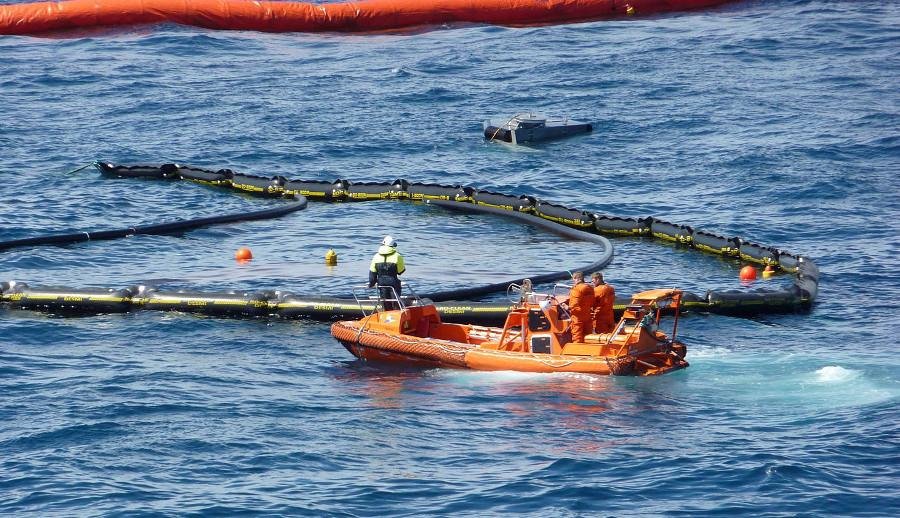Oil spill shows we must “end our 120-year addiction to fossil fuels”

Around 200 barrels of reservoir fluid containing oil leaked into waters around a harbour in the south west of England at the weekend.
The liquid leaked into Poole Harbour in Dorset, out of a pipeline from a nearby oil field called Wytch Farm. The spill was quickly declared a “major incident”, with swimmers warned to stay away from the water.
Perenco, the company that owns the oil field, have said they do not know what caused the leak. According to the firm the liquid that spilled was made up of 85% water and 15% oil, with around 60 tonnes of fluid leaking out of the pipeline in total.
Poole Harbour is recognised as an internationally important wetland, and is a specially protected area as well as a site of special scientific interest. As well as being home to a number of animal species that are rare and endangered, it’s an important stopover site for migratory birds and a breeding ground for marine life, making it a crucial location for wildlife conservation in the UK.
Environmental damage
Since the spill happened a number of oiled birds have been spotted in the area. The Royal Society for the Protection of Birds (RSPB) has said it is too soon to know the full impact of the leak on the local wildlife, but is “very concerned” about how it will affect migratory birds.
Caroline Dennett, an environmental activist based in Dorset, said the incident is “devastating environmentally”. “It’s more evidence that we need to just stop oil, say no to new drilling and extraction, like the previously proposed new oil well near Puddletown here in Dorset. We need to transform the energy system, to end and recover from our 120-year addiction to fossil fuels.”
Dennett has first-hand knowledge of the damage caused by oil spills. Last year she quit her role as operational safety consultant for Shell over the oil firm’s double talk on climate change. She was hired by Shell to conduct safety assessments after the Deepwater Horizon oil spill took place, a disaster that killed 11 people when millions of barrels of oil were pumped into the Gulf of Mexico by BP. She made the decision to stop working for them when she learned that despite their public claims to reach a net zero goal they are continuing to launch new extraction projects and open new oil fields.
Profit and recklessness
Speaking to NADJA in July last year, Dennett said: “There are going to be seven or eight of these new extraction and exploration projects down the line. Even in the Niger Delta, which is so polluted and has been damaged beyond repair, they’re still doing this. I realised they have no intention of winding this down.”
“As an organisation they don’t care because they don’t see how they can make a profit from renewables. They love fossil fuel energy because it’s so expensive to produce and it justifies their ends, so they can get subsidies and tax breaks.”
Commenting on the incident in Poole Harbour, she said: “The Health and Safety Executive and safety consultants like myself will tell you that all incidents such as leaks and spills are preventable. However, profit-incentives drive recklessness, or failings in the process safety barriers through poor maintenance or uncontrolled risks. Whatever the root cause, this incident was preventable, and we have no tolerance for further risks.”
Divest from fossil fuels
The local councils of Bournemouth, Christchurch and Poole recently voted to divest funds from fossil fuel investments, and Dorset Council has rejected planning permission for a new incinerator. “There should be appetite to put a stop to Perenco’s Wytch Farm production site,” Dennett said. “They only serve the global market and its greedy shareholders.”
“We need support for offshore wind projects, like the previously rejected Navitus Bay project. All existing genuinely clean renewables at our fingertips and in development need government support through policy change and funding, not £3 billion for North Sea’s Rosebank.”
A number of organisations including Extinction Rebellion, Global Women’s Strike and Greenpeace will be surrounding the Houses of Parliament in London from April 21 – 24 to demand action on the UK’s interconnected crises of climate change and cost of living.
READ MORE: “There is no net zero plan”: Caroline Dennett on quitting Shell over climate double talk
Featured image: Offshore Norge / CC BY-SA 2.0
